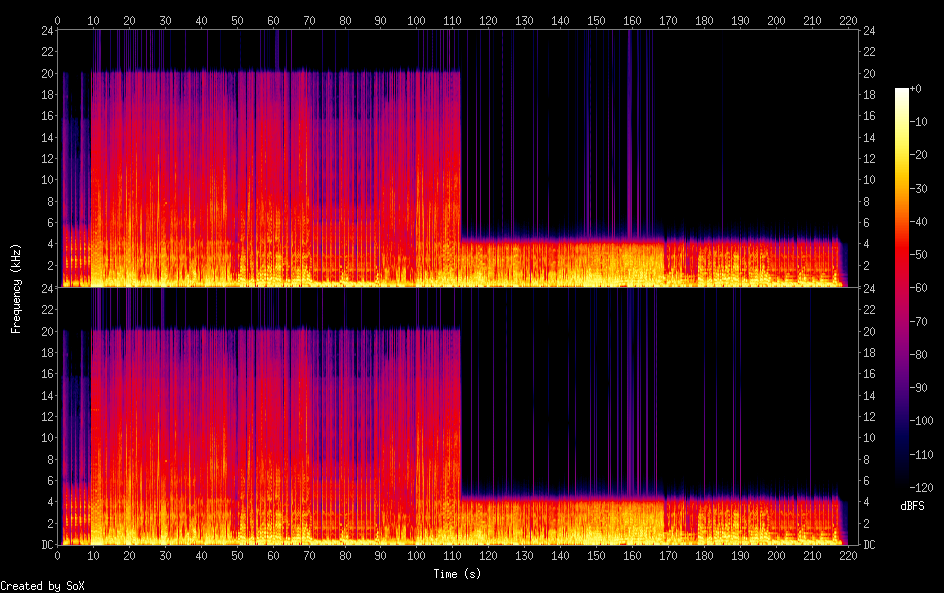The answer was bitrate. I typed that as a guess, then got on the VCR thing because that made more sense. S-M-R-T.
I'm miffed by the imprecision of that summary. Allow me to get pedantic.
In the analog realm, yes, bitrate and sampling rate are related. The maximum data rate of a POTS line (assuming no data compression) is 64 kbps. That is as high as you can ever go, assuming perfect conditions. That's because these POTS lines can only transmit 8-bit (
non-linear) PCM at 8000 Hz. 8 bits * 8000 Hz = 64000 bits a second.
Indeed, a VHS tape recording at a third of its normal tape speed (known as EP/SLP) only has a bandwidth of ~1 MHz total (compared to ~3 MHz normally, ~6 MHz for broadcast NTSC signals) to encode the entire video signal. It's sampling at a lower rate overall, so it encodes less information on its magnetic tape. That's why the video looks blurrier than one running at normal speed.
However, once you go digital, they're no longer as strongly related. I'll give this caveat: in uncompressed formats (raw anything, especially audio), they are related quite strongly. A raw stereo 192 KHz, 24-bit PCM file has 12x the bitrate of a raw mono 48 KHz, 16-bit PCM file. Bitrate = (no. of channels) * (sampling rate) * (bit depth). Indeed, if you just mess with the sampling rate, you're going to see that the bitrate is closely-tied to sampling rate.
(As a footnote, I'll point you to
24/192 Music Downloads ...and why they make no sense for why going above 48 KHz is totally unnecessary for an end-user. Or, if you want a video demonstation, I'll point you to
Digital Show and Tell.)
For lossy formats, however, bitrate and sampling rate are no longer intrinsically tied to each other. Now, the lines do get somewhat blurred. LAME, the de facto standard MP3 encoder, does not let you go all the way down to 8 kbps unless if you also decrease the sampling rate down to at most 24000 Hz, which is really only good enough for speech. I can demonstrate right now with a copy of Audacity and
a copy of Tom's Diner by Suzanne Vega. Import the song into Audacity, and attempt to save it as MP3 at a constant bitrate of 8 kbps. This happens:

(I got pranked by FFmpeg by trying to produce an 8 kbps MP3.
-r and
-ar are entirely different arguments. I'm too lazy to demonstrate with it again.)
This also occurs in more advanced formats like Opus. Opus is built on the music-oriented CELT algorithm and the speech-oriented SILK algorithm. CELT is good at music, stretching across the entire human hearing frequency range (maxing out at 48 KHz sampling rate/24 KHz max. frequency). However, it needs more bandwidth to work. That's where SILK comes in. It's good at encoding speech at low bitrates, but its frequency range is limited, only going up to 16 KHz sampling rate (8 KHz max. frequency).
The magic of Opus is that at lower bitrates, it's able to switch between (or even run both) the algorithms as needed. I'll use
Money Game Part 2 by Ren. Here's a spectrogram, showing the original (Opus @ 160 kbps), Opus @ 24 kbps, Opus @ 16 kbps, Opus @ 12 kbps, and Opus @ 8 kbps, in that order. They're evenly-spaced in 45-second intervals.

Here, bitrate is related to sampling rate because at these low bitrates, the Opus encoder needs to conserve what little bitrate it has by using the SILK algorithm (itself frequency-limited) in tandem with the CELT algorithm. At 12 kbps and lower, however, it stops using CELT, using SILK exclusively, and you can see the maximum frequency drop. At that point, Opus is no longer able to run the CELT algorithm due to bitrate constraints. It loses the high frequency parts entirely because of this. As the bitrate drops further, the sampling rate drops all the way down to 8000 Hz, losing even more high-frequency parts.
That being said, you absolutely can do stupid shit like encoding 256 kbps Opus with a sampling rate of 8000 Hz. Try the following in a terminal:
ffmpeg -i foo.flac -c:a libopus -b:a 256k -ar 8000 foo-opus-256k-8000.webm
If you then run
ffprobe on it, you will see:
Input #0, matroska,webm, from 'foo-opus-256k-8000.webm':
Metadata:
ENCODER : Lavf59.0.101
Duration: 00:03:42.58, start: 0.000000, bitrate: 270 kb/s
Stream #0:0(eng): Audio: opus, 48000 Hz, stereo, fltp (default)
I mean, Opus forces a nominal sampling rate of 48000 Hz regardless of bitrate, but if you listen to it, it will sound muffled because the audio's been downsampled to 8000 Hz. Here's a spectrogram of Money Game Part 2, original and downsampled to 8000 Hz:

Bitrate and sampling rate are not inherently tied to each other in the digital realm. While most codecs are "smart" and won't let you encode, say, 48 KHz audio at 8 kbps, the reverse is not true. You can easily encode 8000 Hz audio at 256 kbps without much issue. They cannot stop you.
This post has been brought to you by the Department of Why The Hell Do I Know This.
 Author
Topic: The small random questions thread [WAAAAAAAAAAluigi] (Read 691288 times)
Author
Topic: The small random questions thread [WAAAAAAAAAAluigi] (Read 691288 times)
